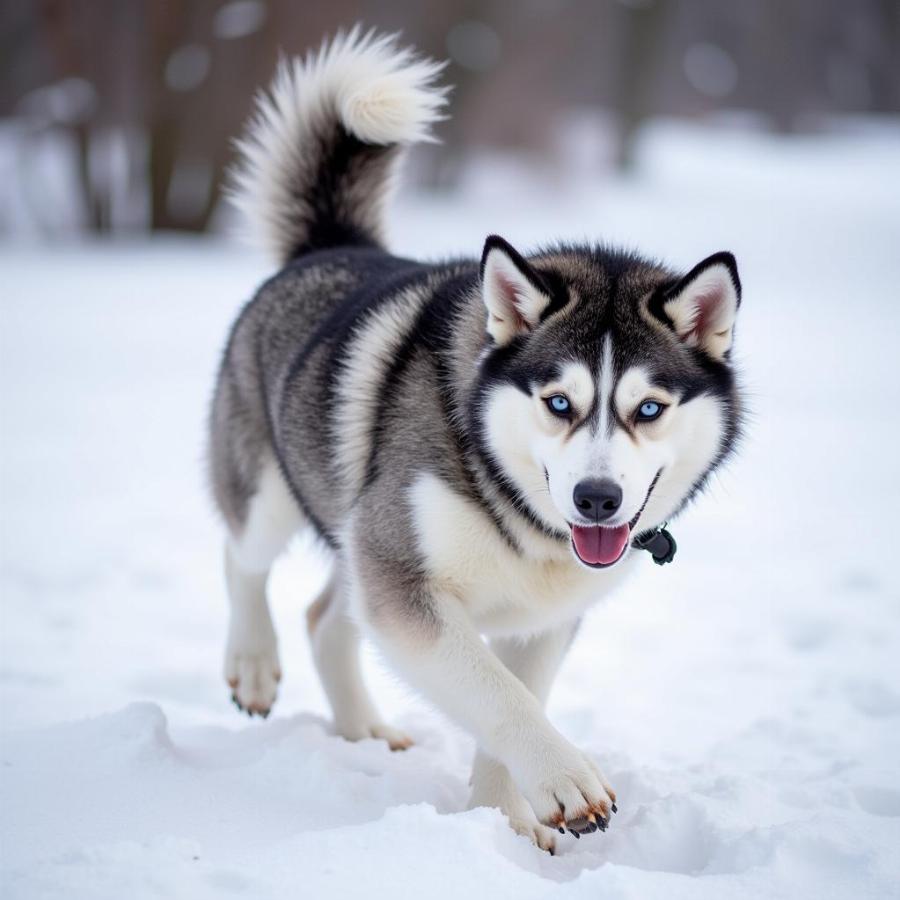The search for “short haired husky dog” might leave you wondering if such a thing exists. After all, the Siberian Husky is famous for its thick double coat. While a truly “short haired” husky doesn’t exist in the same way as breeds specifically bred for minimal shedding, some huskies have variations in their coat length, leading to a seemingly “shorter” fur. Let’s dive into what creates these variations and what you should know about owning a husky, regardless of coat length.
Understanding the Husky Coat
To understand why a “short haired husky” is a bit of a misnomer, we need to understand the magic of the husky’s double coat. This double layer of fur is designed to withstand harsh Arctic conditions.
- The Undercoat: This soft, dense layer provides insulation and warmth.
- The Guard Hair: These longer, coarser hairs protect against elements and dirt, and give the husky their distinctive markings.
Both layers play a crucial role in regulating the husky’s body temperature, keeping them cool in summer and warm in winter.
 Short-haired husky playing in the snow
Short-haired husky playing in the snow
Factors Influencing Coat Length in Huskies
Several factors can influence a husky’s coat length:
- Genetics: Just like humans, huskies inherit genes that determine their physical traits. Some lines might carry genes for a slightly shorter coat than average.
- Age: Puppies often have softer, shorter fur than adult huskies. As they mature, their coat may become thicker and longer.
- Spayed/Neutered: Dogs spayed or neutered at a young age sometimes develop a softer, slightly shorter coat.
- Climate: Huskies living in warmer climates might naturally have a slightly shorter coat than their counterparts in colder regions.
- “Wooly” Huskies: Some huskies carry a recessive gene that leads to a longer, softer coat, sometimes mistaken for a shorter coat due to its less “fluffy” appearance.
Living with a Husky, Coat and All
While a truly “short haired husky” might not be a recognized breed variation, understanding coat variations helps potential owners set realistic expectations. It’s crucial to remember that all huskies, regardless of coat length, will shed, especially during shedding season.
Here’s what every husky owner should be prepared for:
- Regular Brushing: Frequent brushing helps remove loose fur, prevents mats, and keeps their coat healthy.
- Seasonal Shedding: Expect a significant increase in shedding during spring and fall as the husky “blows” their coat.
- No Shaving: Shaving a husky can damage their coat and disrupt their ability to regulate temperature.
Choosing the Right Husky for You
When choosing a husky, focus on temperament, energy levels, and overall health rather than fixating on coat length. A reputable breeder can help you find a husky that matches your lifestyle.
“Choosing a husky based solely on coat length is like choosing a car based on its color,” says renowned breeder Sarah Williams. “It’s important to consider the dog’s personality, energy level, and overall health first and foremost.”
Remember, owning a husky is a commitment. These intelligent, independent dogs thrive on activity and companionship. Before welcoming a husky into your home, regardless of coat length, be sure you’re ready to provide the love, training, and care these incredible dogs deserve.
FAQs: Short Haired Huskies
Are short haired huskies hypoallergenic? No, all huskies shed and produce dander, which can trigger allergies.
Do short haired huskies need less grooming? While they might shed slightly less, all huskies require regular brushing, especially during shedding season.
Are short haired huskies healthier? Coat length doesn’t directly correlate to health. Responsible breeding and proper care are crucial for any dog’s well-being.
Explore More About Huskies
Interested in learning more about specific husky breeds or caring for your furry friend? Check out these articles:
Beaut Dogs: Your Guide to the Wonderful World of Dogs
Beaut Dogs is your trusted source for all things dog-related. We’re passionate about providing reliable, insightful information to help you understand and care for your canine companions. For any questions or assistance, please feel free to reach out to our team at [email protected]. We’re always happy to help!